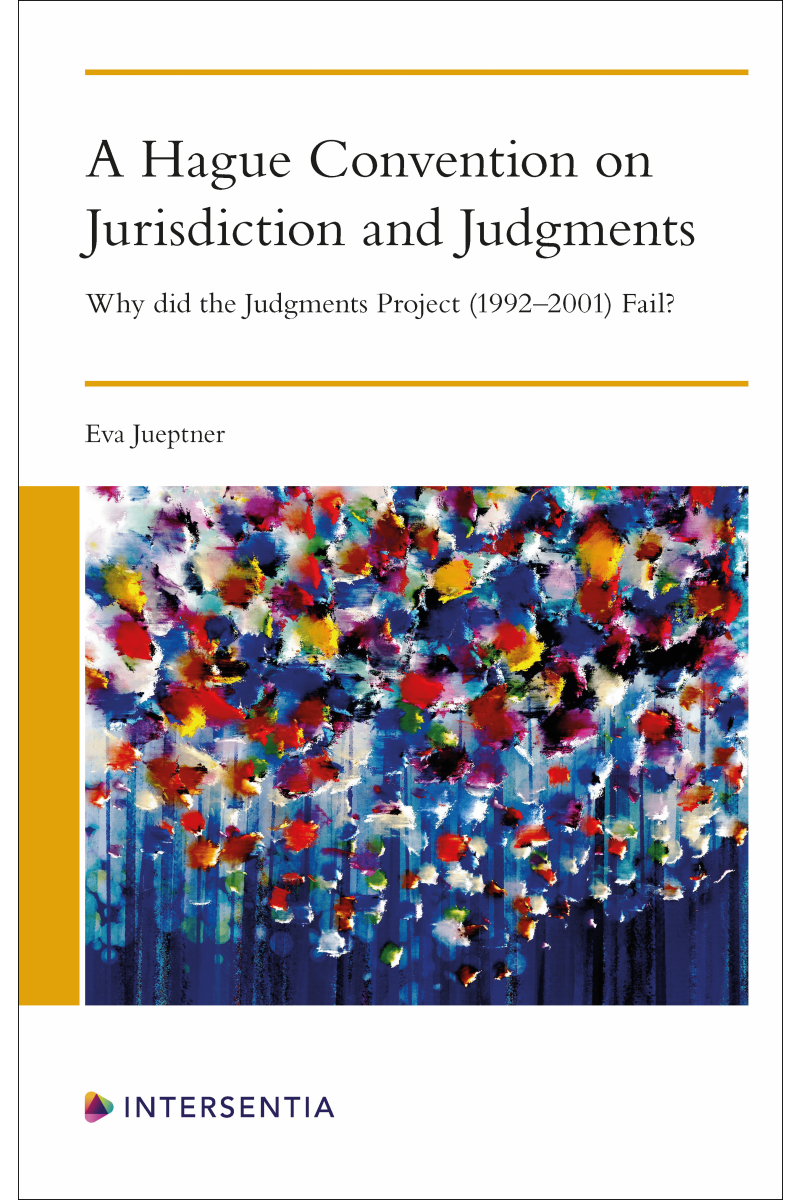 maestro
mastercard
visa
maestro
mastercard
visa

A Hague Convention on Jurisdiction and Judgments
Why did the Judgments Project (1992-2001) Fail?

A Hague Convention on Jurisdiction and Judgments (1992–2001): Why did the Judgments Project Fail? provides the first comprehensive analysis of the question of why the original Judgments Project of the Hague Conference on Private International Law failed in 2001. The ‘Judgments Project’, sometimes referred to as the holy grail of private international law, was a remarkable and important undertaking. Its purpose was to create a global regime to secure the recognition and enforcement of foreign judgments in civil and commercial matters, as well as globally applicable rules on international direct jurisdiction, determining which national courts can hear international civil and commercial proceedings. Key players in the project included the member states of the European Community and the United States of America.
By applying an interdisciplinary approach of legal analysis and project management, the book demonstrates that the preparation and management of the pre-negotiation phase of the project were not commensurate to the complexity of the endeavour, which is likely to have contributed substantially to the discontinuation of the project. The patterns of previous successful Hague Conference project management, as demonstrated by the work on the 1980 Hague Child Abduction Convention and the 1993 Intercountry Adoption Convention, are also analysed, with the perspective that these patterns, which comprised an assessment of the need for and the desirability of new convention projects, as well as their technical and political feasibility, were largely absent from the Hague Judgments Project.
Determining why the Hague Judgments Project failed is important not only from the perspective of legal history, but also for future efforts to unify grounds of jurisdiction on a global level. As this book shows, unifying grounds of jurisdiction on a global level is not an impossible undertaking. Rather, in order to create a successful instrument on jurisdiction, it is vital that the right lessons are drawn from the failed Judgments Project. This book will therefore be of interest for policymakers and legal scholars working on the unification of rules of international direct jurisdiction and rules concerning the recognition and enforcement of foreign judgments in civil and commercial matters. By illustrating that the failure to adopt an approach guided by sound project management principles is likely to have contributed to the failure of the negotiations, this book also contributes to the literature on international relations and successful treaty-making at international conferences and in international organisations.
About the Author
Dr Eva Jueptner is a Lecturer in Law and Baxter Fellow at the University of Dundee (Scotland, United Kingdom). Prior to joining the University, Eva worked at the Institute for Private International Law and Civil Procedure at the University of Bern (Switzerland). Eva's research focuses on private international law in general, and on issues of international jurisdiction and the recognition and enforcement of foreign judgments in civil and commercial matters in particular.
| Type of product | Book |
|---|---|
| Format | Paperback |
| EAN / ISSN | 9781839704321 / 9781839705342 |
| Weight | 400 g |
| Status | Available |
| Number of pages | 230 p. |
| Access to exercice | No |
| Publisher | Larcier |
| Language | English |
| Publication Date | Mar 29, 2024 |
| Available on Strada Belgique | No |
| Available on Strada Europe | No |
| Available on Strada Luxembourg | No |
Downloads
- Table of Contents and Front Matter
- Introduction: The History of a Hague Judgments Convention
- Chapter 1. The Choice of the Negotiating Agency: Law Making at the Hague Conference on Private International Law
- Chapter 2. Did the Judgments Project Fail Because No Comprehensive Feasibility Studies Regarding the Convention Type were Prepared?
- Chapter 3. Did the Judgments Project Fail Due to a Lack of Interest from the Member States of the European Community and the United States?
- Chapter 4. Did the Judgments Project Fail Due to a Lack of Project Management by the Permanent Bureau?
- Chapter 5. Did the Judgments Project Fail Due to a Lack of Preparation of the Special Commission Meetings between 1997 and 1999?
- Chapter 6. Did the Judgments Project Fail Because the Basis for Consensus-Building was Missing During the Diplomatic Session?
- Chapter 7. Did the Judgments Project Fail Because the United States Voiced their Concerns about the Project Too Late in Time?
- Chapter 8. Did the Judgments Project Fail Because the Opposition of the European Bloc Towards a True Mixed Convention would have been Impossible to Overcome?
- Chapter 9. Conclusions: Lessons (to be) Drawn from the Failure of the Judgments Project
- Bibliography
- Index